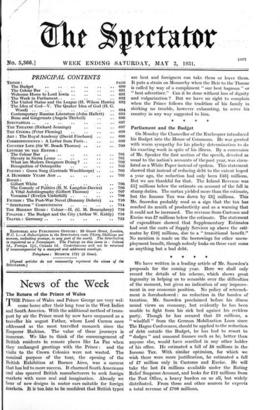Parliament and the Budget On Monday the Chancellor of the
Exchequer introduced his Budget into the House of Commons. He was greeted with warm sympathy for his plucky determination to do his exacting work in spite of his illness. By a concession of Mr. Speaker the first section of the speech, devoted as usual to the nation's accounts of the past year, was circu- lated as a White Paper instead of spoken. This statement showed that instead of reducing debt to the extent hoped a year ago, the reduction had only been £43i- millions. But we are thankful for that. The Inland Revenue was £51 millions below the estimate on account of the fall in stamp duties. The surtax yielded more than the estimate, but the Income Tax was down by £31 millions. This Mr. Snowden probably read as a sign that the tax has reached its zenith of productivity and as a warning that it could not be increased. The revenue from Customs and Excise was £7 millions below the estimate. The statement of expenditure showed that Supplementary Estimates had sent the costs of Supply Services up above the esti- mates by £101 millions, due to a "transitional benefit." No mention is made on the borrowings for other unem- ployment benefit, though nobody looks on these vast sums as anything but a bad debt.




































